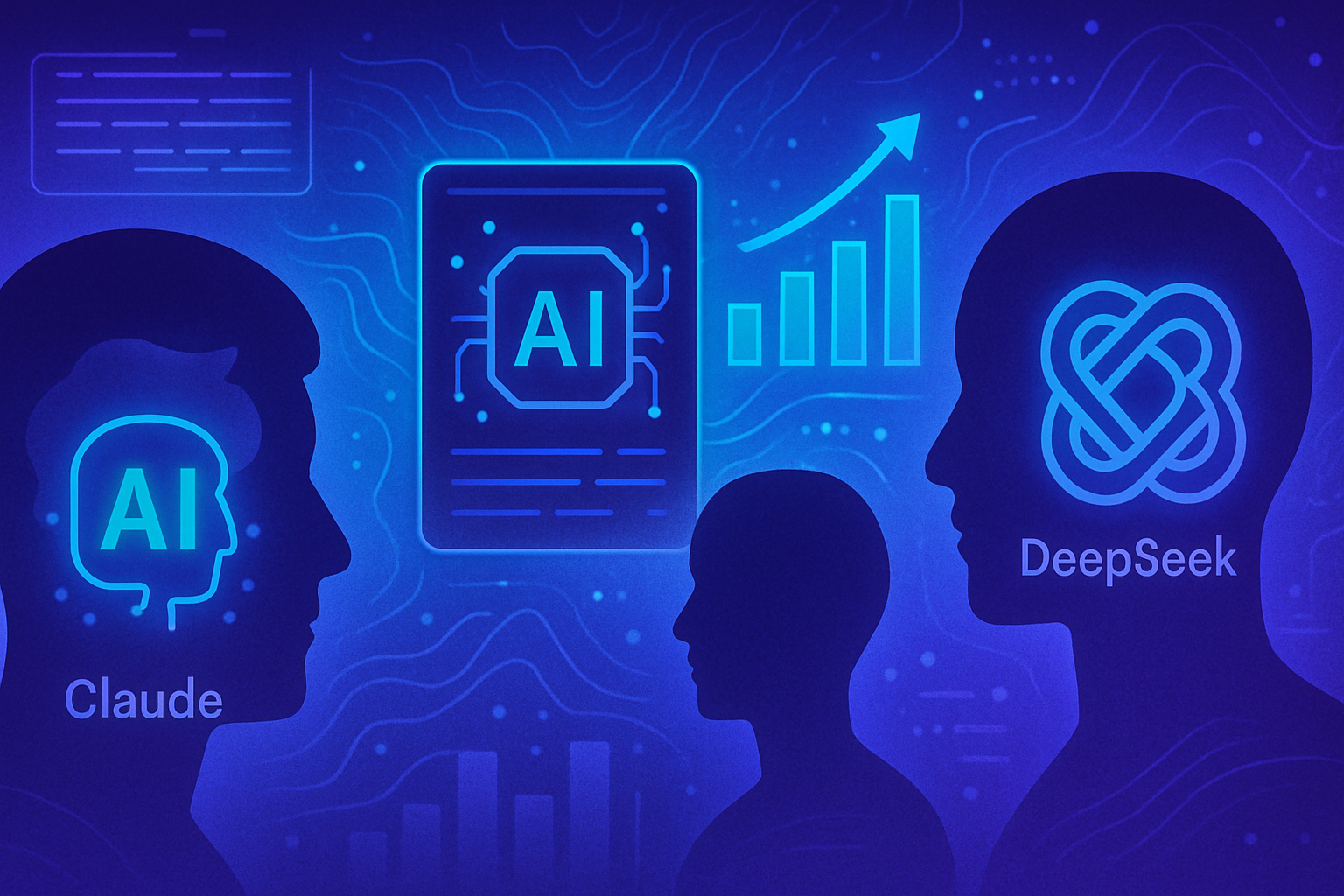The proliferation of AI chatbots transcends the simple debate about their popularity. Notable advancements in the OpenAI ecosystem confront iconic competitors such as Claude and DeepSeek, precipitating a new and singular dynamic. Analyzing these players becomes essential to grasp future trends. Each tool reveals particularities that shape the emerging landscape, making this competition both exciting and essential.
ChatGPT: The Unwavering Leader of Generative AI
ChatGPT positions itself as the indispensable pioneer of AI chatbots. Its influence in the market is immense, with a total of 46.5 billion visits during the analyzed period. Statistics from the agency OneLittleWeb illustrate its dominance, with traffic reaching 48.36% of the total AI tools.
The success of ChatGPT lies in its integration with the OpenAI ecosystem and with Microsoft products, increasing its visibility and adoption. Each month, it attracts 5.01 billion users, a record figure showcasing its engagement with the public. In addition to its growing usage, ChatGPT remains the most mentioned conversational agent in the media with approximately 2.4 million citations.
Grok: The Rising Outsider
Developed by xAI, Grok has experienced a meteoric rise in popularity, climbing by 13,434% in a year. With 686 million visits, it represents a share of 1.17% of total AI chatbot traffic.
Integrated with X, the influential platform of Elon Musk, Grok benefits from substantial media exposure. The trajectory of its rapid ascent places Grok among the most promising chatbots in the market, capturing user attention despite its recent emergence on the scene.
Gemini: The Emerging Star in Google’s Shadow
Gemini, designed by Google, maintains a respectable presence with 1.74% market share and 1.6 billion annual visits. Its average monthly performance of 246.2 million visits indicates steady growth. Despite its position and resources, Gemini struggles to retain users, with an average session duration of 11 minutes and 13 seconds.
Its integration with Google products gives it a significant advantage in distribution, but this potential seems underutilized regarding user retention. The intense competition could harm its long-term development.
Claude: The Retention Champion
Claude stands out for its ability to maintain user interest, showing an average session duration of 16 minutes and 44 seconds. Although less popular in terms of visits, totaling 1.15 billion for the year, its original features, such as the Artifacts, enhance the user experience.
The quality of its interactions fosters positive word-of-mouth, consolidating its market position. Its media results, with one million citations and 118,000 reviews on App Stores, demonstrate stable growth supported by user satisfaction.
DeepSeek: The Rise and Fall of a Contender
DeepSeek experienced a rapid ascent, reaching its peak in January 2025 with an impressive 520 million visits. It represents an interesting alternative to ChatGPT, offering equivalent results at reduced costs. However, after this flamboyant start to the year, a downward trend has set in.
The crucial media coverage it initially received contributed to its success, but as the excitement wanes, DeepSeek appears to be facing challenges in maintaining its user base. Despite this fluctuating dynamic, it remains an important player, having totaled 2.7 billion visits for the year.
Towards the Future of AI Chatbots
The results of the OneLittleWeb study highlight the emergence of fierce competition in the AI chatbot market. The growing presence of Grok, Gemini, Claude, and DeepSeek on center stage reflects the rapid evolution of the sector. The question arises: who will manage to carve out a niche amid ChatGPT’s dominance?
Follow developments on this subject, particularly the impact of new technologies and emerging players on this dynamic landscape. Recent developments at other companies, such as Nvidia or the initiatives of Anthropic, illustrate this commitment and competitiveness. Thus, the coming year promises rich innovations and upheavals.
Frequently Asked Questions
Who are the main competitors of ChatGPT in the field of AI chatbots?
The main competitors of ChatGPT include Grok, Gemini, Claude, and DeepSeek, each with their specificities and advantages in the market.
What distinguishes Grok from other AI chatbots?
Grok, developed by xAI, has experienced rapid growth due to its integration with X and the notoriety of its founder, Elon Musk.
How does Gemini compare to ChatGPT?
Although Gemini has slightly more than 1.6 billion annual visits, it suffers from limited capacity to retain users compared to ChatGPT.
What is Claude’s main strength compared to its rivals?
Claude stands out for the quality of its user experience and its ability to retain visitors, showing a longer average session duration than its competitors.
What has been DeepSeek’s journey in the chatbot market?
DeepSeek exploded in popularity due to intense media coverage but has faced a notable decline after a peak in attention, nonetheless maintaining a respectable volume of visits.
Why does ChatGPT remain the leader in the chatbot market?
ChatGPT benefits from strong notoriety, integration into Microsoft products, and a large share of traffic that confers a dominant position in the market.
What performance indicators were used to evaluate these chatbots?
Eight indicators were examined, including visibility, growth, notoriety, and user experience to establish comparative scores.
In terms of user engagement, how do these chatbots rank?
ChatGPT gathers the largest number of interactions, while Claude and Grok show promising engagement rates, while Gemini struggles to retain its visitors.
What is Claude’s growth strategy?
Claude relies on word-of-mouth and user satisfaction to ensure its growth rather than on intensive marketing campaigns.






